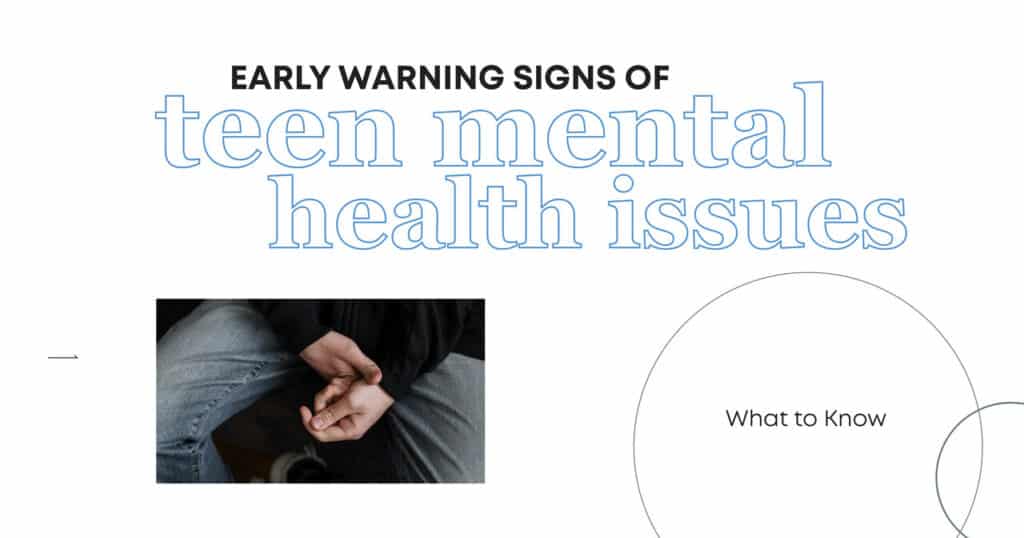Teen mental health is a matter of great concern and impacts families, schools, and communities. It is essential to recognize the early warning signs of mental illness in teenagers to help them thrive. This guide will discuss the most significant factors that affect mental health in teens, including what contributes to mental health challenges, how to recognize warning signs, and ways to support young people through these struggles.
What Is Impacting Adolescent Mental Health Today?
Teenagers undergo many changes, physical and social. These changes become stressful and often cause mental health issues. The most influential factors are:
| Academic Stress | Teenagers are often pressured to maintain high grades and meet other performance standards. |
| Social Media | Constant comparisons on various platforms and cyberbullying contribute to increased anxiety and decreased self-confidence. |
| Family Environment | A teenager raised in an unstable home environment, or one with constant conflict, may develop mental health of teens. |
| World Crisis | Issues like climate change, epidemics, and political uncertainty are rising among youth, often leading to feelings of fear or hopelessness. |
Awareness of these factors can provide an initial step to investigate signs of mental illness in adolescents and promote a healthy climate.
How Many Teens Have a Mental Health Issue?
Most people believe that mental conditions are pretty common in teens. Numbers will prove that it is indeed:
- Almost 1 in 5 teens is affected by some form of mental health disorder. These numbers are going up across the board.
- Mental health conditions in teens that may impair their daily living include depression and anxiety.
- Suicide is one of the leading causes of death among teenagers, often due to unresolved mental health issues or lack of treatment.
These factors highlight the urgent need for awareness and support. Putting this before them, “How many teens have mental health issues?” parents, teachers, and communities will be able to know how to create support areas where teens are empowered in case they require assistance or someone to speak with them.
How Does Mental Health Affect Teenagers?
Poor mental health doesn’t just affect an individual’s mood. It impacts nearly every aspect of their life, few are the following:
- Academic Performance. Mental health influences a teen’s behavior toward studying. Impaired concentration and a lack of interest in a subject led to lower grades, which caused frustration at school.
- Social Relationship. You may struggle to socialize due to mental health issues like anxiety or depression, which can lead to isolation.
- Physical Health. Mental health problems tend to have physical manifestations,, such as headaches, stomachaches, fatigue, and a weakened immune system.
- Risk Behavior. Teens without healthy coping mechanisms may turn to substance use or self-harm.
Knowing how mental health affects teens can give parents and caregivers the proactive, compassionate support that can make all the difference in the world.
Common Mental Health Problems in Teens
Teenagers experience various mental health conditions, each with unique symptoms and effects. Here’s a closer look at some of the most common conditions:
- Major Depression
Depression affects a teenager’s mood, energy, and outlook. Warning signs include a persistent sadness or emptiness, a withdrawal from activities they previously enjoyed, a significant change in appetite, and disturbance of sleep.
- Anxiety Disorders
Anxiety disorders are those conditions that majorly include generalized anxiety disorder (GAD), social anxiety, and panic disorders. They can be demonstrated as excessive worrying, restlessness, difficulty focusing, or avoiding certain situations.
Teenagers who have ever had exposure to trauma, such as abuse, accidents, or even an eyewitness of violence, develop PTSD. Examples of symptoms include nightmares, flashbacks, avoidance of things that remind them of the trauma, or detachment.
Extreme mood swings characterize this condition. The moods can shift from euphoric highs to depressive lows. One minute, the teenager can appear hyperactive and impulsive. The next, he is hopeless and exhausted.
- Obsessive-Compulsive Disorder (OCD)
Teenagers with OCD are controlled by unwanted, intrusive thoughts that make them perform repeated behaviors such as handwashing, counting, or checking. The rituals hinder daily activities and cause much stress.
- Behavioral Addictions
This engagement can be excessive gaming, social networking, or even shopping, which is a type of addictive behavior. The major worries and depression are masked by this kind of addiction, which also diverts sleep, school, and many relationships.
- Self-Harming
Self-injury, such as cutting, burning, or hitting, is a way some teens cope with overwhelming emotional pain. These behaviors need to be identified first for effective intervention.
- Substance Use Disorder
Teenagers suffering from mental illness are usually masked through substance use, either drugs or alcohol. Substance abuse usually makes mental illness symptoms worse, and it then creates a vicious cycle.
Parents and professionals can identify these signs early and seek intervention and treatment to help teenagers manage their mental health.
Causes of Mental Illness in Youth
Understanding the causes of mental health issues may help either prevent or reduce their impact:
- Biological Factors. Genetics and chemistry in the brain determine a lot of mental health conditions.
- Environmental Stressors. The presence of bullying, abuse, or unstable situations within the environment may cause some mental health issues.
- Changes in Development. Hormonal changes and brain alterations during adolescence increase susceptibility to mental health issues.
- Social Pressure. Some issues are relatively unique among teenagers, such as peer pressures and societal requirements.
How Do I Know If My Teenager Has a Mental Illness?
Recognizing mental health issues in teens begins by identifying warning signs:
Signs of Mental Illness in Children and Teens
- Sudden changes in mood or irritability.
- Withdrawal from family and friends.
- Unexplained physical symptoms such as headaches or stomachaches.
Teenage Mental Illness Symptoms
- Persistent feelings of depression or hopelessness.
- Appetite or sleep cycle changes.
- Poor academic performance or lack of interest in school activities.
Teenage Mental Breakdown Symptoms
- Emotional outbursts or panic attacks.
- Extreme fatigue or inability to get out of bed.
- Injecting or using substances.
- Self-harm or suicidal thoughts.
Seek professional help if you detect any of these signs of mental illness in teenagers.
Diagnosing Mental Illness in Children and Adolescents
Diagnosing these mental problems will involve consultation between the parents, teachers, and medical practitioners. This is what happens in this case:
- Pre-testing. Pediatrics or school counselors usually detect initial symptoms.
- Psychological Tests. A licensed therapist typically conducts the interviews and completes a questionnaire to conclude the diagnosis.
- Co-operate Treatment. The process may involve medication, therapy, or lifestyle changes.
Call to Action:
Never hesitate to take action if you’re concerned about your teen’s mental health. This can prevent worse things from happening and be a support for them that helps them succeed. You should take action today.
- Consult a qualified mental health professional.
- Learn about local and online services for how to help a teenager with mental health issues.
- Start a conversation with your teenager to understand what he or she is going through.
Together, we can take care of the mental health issues in teens and provide them with healthy and balanced lives.
FAQ’s
- What are the early warning signs of mental illness in teenagers?
Mood changes, staying away from social contacts, poor performance at school, new changes in sleep or eating habits, and more extreme anger or sadness.
- How does mental health affect teens’ daily lives?
Mental illness will affect their academic performance, bodily well-being, relationships, and general quality of life. Teens who experience mental illness end up cutting off themselves or going into other dangerous behaviors.
- What are the most common mental health issues in teens?
The disorders include depression, anxiety disorder, PTSD, bipolar disorder, OCD, behavioral addiction, and substance use disorders.
- How can parents help a teenager with mental health issues?
A parent might be helpful simply by being a good listener providing a neutral space in which the child feels safe enough to open up about their problems. They might also help the child seek professional assistance and become patient and understanding.
- Which of these is not a potential warning sign of a mental health condition?
Generally speaking, if nothing about their behavior or mood seems different, then there isn’t necessarily a mental health issue. Usually, there are very subtle signs that people overlook. Vigilance is the key.




